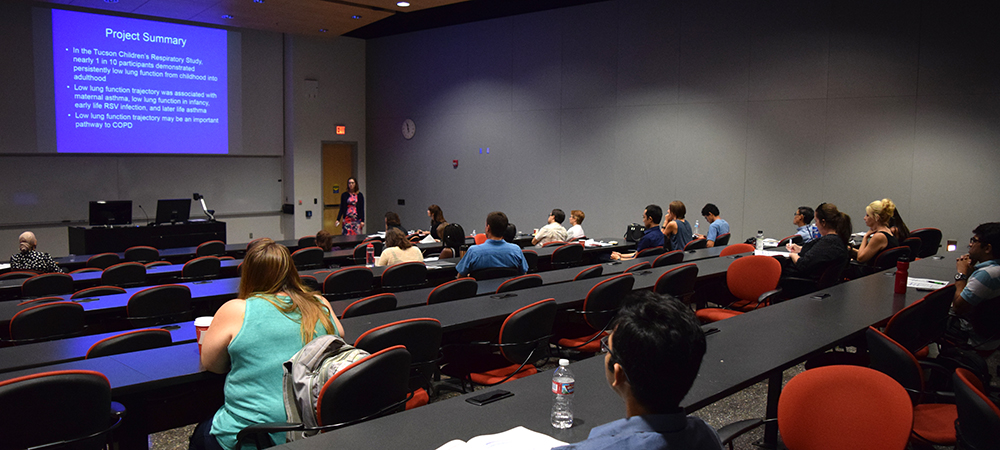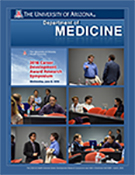
 The University of Arizona Department of Medicine was well represented at the inaugural UA Health Sciences Career Development Award Research Symposium, held June 8 in Drachman Hall B109. The event was moved that morning from the Skaggs Pharmaceutical Sciences Center due to faulty air conditioning. It was live-streamed via webcast, an archived recording of which can be viewed here: UAHS MedTV
The University of Arizona Department of Medicine was well represented at the inaugural UA Health Sciences Career Development Award Research Symposium, held June 8 in Drachman Hall B109. The event was moved that morning from the Skaggs Pharmaceutical Sciences Center due to faulty air conditioning. It was live-streamed via webcast, an archived recording of which can be viewed here: UAHS MedTV
 The awards, created in 2014 by the UA Office of the Senior Vice President for Health Sciences, offer an opportunity for recognition and funding for junior faculty research contributions to advancing medical science. To view more photos from the event,
The awards, created in 2014 by the UA Office of the Senior Vice President for Health Sciences, offer an opportunity for recognition and funding for junior faculty research contributions to advancing medical science. To view more photos from the event, ![]() click here [PDF] or on the image at left.
click here [PDF] or on the image at left.
Among the 15 recipients of 2014 and 2015 UAHS CDAs who presented their research and findings at the all-day event were seven associated with our department and its 13 divisions. Fiveof the eight session chairs were also from our department. The CDA program showcases the clinical and translational research by these junior UA Health Sciences faculty members—the next generation of physician-scientists.
DOM representatives and the themes of their presentations, included:
- Olga Rafikova, MD, PhD, research assistant professor, Division of Translational & Regenerative Medicine — “Understanding the gender-specific phenotypes of pulmonary arterial hypertension: another approach for precision medicine”
- Ankit A. Desai, MD, FAHA, FACC (pictured above right with Drs. Kraft and Yuan), assistant professor, Division of Cardiology/Sarver Heart Center, and principal investigator, Molecular Cardiovascular Research Program — “Interdisciplinary studies in sickle cell disease – bench to bedside approaches to unravel cardiovascular phenotypes”
- Cristine E. Berry, MD, MHS, assistant professor, Division of Pulmonary, Allergy, Critical Care and Sleep Medicine, a UA Reynolds Scholar in Applied Geriatrics, and director, Pulmonary Function and Exercise Physiology Laboratory — “A distinct low lung function trajectory from childhood to the fourth decade of life”
- Archita P. Desai, MD, assistant professor, Division of Gastroenterology, and associate, Liver Research Institute — “Hospital admissions and readmissions in patients with cirrhosis: The role of co-morbid conditions”
- Jarrod M. Mosier, MD, assistant professor and associate program director, Critical Care Fellowship, Division of Pulmonary, Allergy, Critical Care & Sleep Medicine — “Development of novel methods of respiratory support for acute lung injury”
- Pavani Chalasani, MD, MPH, assistant professor, Division of Hematology & Oncology, and member UA Cancer Center, — “Development of predictive biomarkers for AI-induced MSK side effects in patients with breast cancer”
- Christian Bime, MD, MSc, assistant professor, Division of Pulmonary, Allergy, Critical Care & Sleep Medicine, and director, Medical Intensive Care Unit, Tucson Campus — “SELPLG as a candidate gene in acute respiratory distress syndrome”

 Dr. Berry also presented the work for Eyal Oren, PhD, MS, assistant professor, Epidemiology & Biostatistics, on “Chronic stress and asthma among children and adolescents.” At the end of her own presentation, Dr. Berry was presented with an award (left) and gave a shout-out to #WomenInScience and her young daughter who was filming her mom on a cell phone while seated next to Chuck Cairns, MD, dean, UA College of Medicine - Tucson (right).
Dr. Berry also presented the work for Eyal Oren, PhD, MS, assistant professor, Epidemiology & Biostatistics, on “Chronic stress and asthma among children and adolescents.” At the end of her own presentation, Dr. Berry was presented with an award (left) and gave a shout-out to #WomenInScience and her young daughter who was filming her mom on a cell phone while seated next to Chuck Cairns, MD, dean, UA College of Medicine - Tucson (right).
Hosting the event were Monica Kraft, MD, professor and chair, Department of Medicine, and the Robert and Irene Flinn Endowed Chair of Medicine, UA College of Medicine – Tucson, and Jason X.-J. Yuan, MD, PhD, professor, division chief for Translational & Regenerative Medicine, and UAHS associate vice president for Translational Sciences.
Sessions chairs included Drs. Kraft and Yuan, as well as Stephen Black, MD, professor and director, Lung Vascular Pathobiology Program, Division of Translational & Regenerative Medicine; Yves A. Lussier, MD, professor and director, Center for Biomedical Information & Biostatistics, associate director for informatics, BIO5 Institute and UA Cancer Center, and UAHS associate vice president and chief knowledge officer; Akinlolu O. Ojo, MD, PhD, professor, Division of Nephrology, and UAHS associate vice president, Clinical Research and Global Health Initiatives; and Mindy J. Fain, MD, professor and chief, Division of Geriatrics, General Internal Medicine and Palliative Medicine, and co-director, UA Center on Aging.
Joe G.N. “Skip” Garcia, MD, senior vice president, UA Health Sciences, and the Merlin Duval, MD, Professor of Medicine, gave the symposium’s opening remarks.
UAHS Career Development Award
The Office of the Senior Vice President for Health Sciences at the University of Arizona established the University of Arizona Health Sciences (UAHS) Career Development Award (CDA) program in 2014, following NIH KL2 guidelines, to provide research training and funding opportunities for junior faculty members in the health sciences to foster an academic career in clinical and translational research.
This award represents a key initial step for UAHS to establish and provide well-organized infrastructure and a nurturing environment for training, developing and advancing our next generation of physician-scientists and other health-scientists. The award provides funding to support physicians, physician scientists and health-scientists from other disciplines to develop a research project in an established investigator’s laboratory/program to generate preliminary data for a future competitive grant application. The award allows promising UA health-scientists protected time to conduct clinical and translational research under the direction of a well-funded and highly productive UA research mentor. UAHS-CDA scholars receive salary support of $75,000 per year for two years or funds to cover 75% assigned effort of the current total base salary (if it is less than $75,000), plus fringe benefits. As much as $5,000 per year is available to defray costs associated with the scholar’s research-related activities, including lab supplies, tuition and fees, among other items.
In addition, the UAHS-CDA also provides $1,500 per year for the scholar to travel to academic conferences. The scholars are selected by an UAHS-CDA Advisory Committee, composed of established investigators. The mentor of awarded scholars also receives $5,000/year to contribute toward his/her research program. Almost all of our UAHS-CDA awardees have submitted grant applications to federal and non-federal funding agencies, and many have obtained extramural funding from the NIH (e.g., R01, K23) and foundations (e.g., Foundation for Anesthesia Education and Research).
For more information on how to apply, see: https://research.arizona.edu/internal-funding/uahs-career-development-award-uahs-cda
ALSO SEE:
"UAHS Career Development Award Research Symposium, June 8" | Posted June 1, 2016

